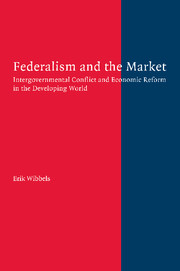Book contents
- Frontmatter
- Contents
- Acknowledgments
- 1 Intergovernmental Bargaining and Economic Policy in Federations
- 2 From Market-Preserving to Market-Distorting Federalism: Divergent Incentives and Economic Reform in Developing Nations
- 3 Federalism and the Decentralized Politics of Macroeconomic Policy and Performance
- 4 Testing the Model: Macroeconomic Reform Beyond the Federal-Unitary Distinction
- 5 Partisan Harmony, Intergovernmental Coordination, and Market Transitions: The Case of Argentina
- 6 Regional Competition, Fiscal Dependence, and Incentives in the Argentine Provinces
- 7 The View from Below: The Politics of Public Sector Reform in Three Argentine Provinces
- 8 Conclusion: Federalism, Reform, and Enduring Puzzles
- References
- Index
2 - From Market-Preserving to Market-Distorting Federalism: Divergent Incentives and Economic Reform in Developing Nations
Published online by Cambridge University Press: 20 July 2009
- Frontmatter
- Contents
- Acknowledgments
- 1 Intergovernmental Bargaining and Economic Policy in Federations
- 2 From Market-Preserving to Market-Distorting Federalism: Divergent Incentives and Economic Reform in Developing Nations
- 3 Federalism and the Decentralized Politics of Macroeconomic Policy and Performance
- 4 Testing the Model: Macroeconomic Reform Beyond the Federal-Unitary Distinction
- 5 Partisan Harmony, Intergovernmental Coordination, and Market Transitions: The Case of Argentina
- 6 Regional Competition, Fiscal Dependence, and Incentives in the Argentine Provinces
- 7 The View from Below: The Politics of Public Sector Reform in Three Argentine Provinces
- 8 Conclusion: Federalism, Reform, and Enduring Puzzles
- References
- Index
Summary
This chapter provides a theoretical account of the diversity of economic outcomes across federations. In doing so, it brings together two heretofore separate literatures – those on the political economy of market reforms in developing nations and federalism – and contributes a new model of how intergovernmental bargaining influences the making of economic policy making in political systems characterized by the geographic fragmentation of political and economic power. I contend that the market reform literature has failed to appreciate the importance of subnational politics for the move toward economic liberalization, particularly in cases in which regional leaders respond to constituencies of their own while controlling significant fiscal and policy-making responsibilities. The federalism literature, by contrast, has understudied federal systems in the developing world and paid insufficient attention to the full variety of relationships between the institutions of federalism and economic outcomes, focusing instead on those that are “market-preserving.” Neither literature accounts for the importance of distinctly subnational politics in shaping the political incentives of crucial decision makers, nor for the key factors that affect intergovernmental conflict over major shifts in economic policy.
The political economy of market reform has been a central topic of social scientists for nearly two decades. As an increasingly interdependent and globalized international economy has provided incentives for the governments of developing nations to reorient economic policy toward freer, more open markets, researchers have focused on the political conditions for successful economic reform.
- Type
- Chapter
- Information
- Federalism and the MarketIntergovernmental Conflict and Economic Reform in the Developing World, pp. 17 - 52Publisher: Cambridge University PressPrint publication year: 2005



